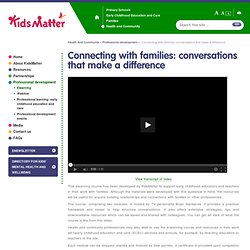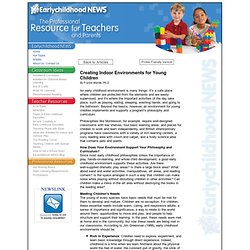

Connecting with families: conversations that make a difference. View transcript of video This elearning course has been developed by KidsMatter to support early childhood educators and teachers in their work with families.

Although the materials were developed with this audience in mind, the resources will be useful for anyone building relationships and connections with families or other professionals. The course, comprising two modules, is hosted by TV personality Brian Nankervis. It provides a practical framework and model to help structure conversations. It also offers extensive strategies, tips and downloadable resources which can be saved and shared with colleagues. Earlychildhood NEWS - Article Reading Center. An early childhood environment is many things: It's a safe place where children are protected from the elements and are easily supervised, and it's where the important activities of the day take place, such as playing, eating, sleeping, washing hands, and going to the bathroom.

Beyond the basics, however, an environment for young children implements and supports a program's philosophy and curriculum. Philosophies like Montessori, for example, require well-designed classrooms with low shelves, four basic learning areas, and places for children to work and learn independently, and British infant/primary programs have classrooms with a variety of rich learning centers, a cozy reading area with couch and carpet, and a lively science area that contains pets and plants.
How Does Your Environment Support Your Philosophy and Curriculum? Meeting Children's NeedsThe young of every species have basic needs that must be met for them to develop and mature. Children are no exception.
Documentation and assessment. Google. Www.eduweb.vic.gov.au/edulibrary/public/earlylearning/high-expectations. Gever Tulley: 5 dangerous things you should let your kids do. Learning Theorists/Theories. Autism. Learning Frameworks. Assessment. Partnerships with Families. Play based learning. Intentional teaching. Nature based learning. Play for wellbeing. Risky play. Child Protection.
Brain info.